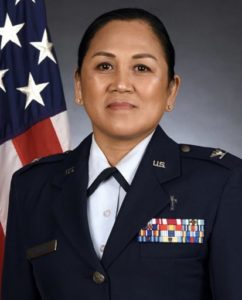Col Boling New Director of ANG Chaplains, with Diversity
 Chaplain (Col) Leah Botona Boling recently became the director of the Air National Guard Chaplain Corps, and the Air Force was quick to point out she was the “first female, person of color” to hold that position. More important to the people she serves, of course, are her beliefs. Oddly, the chaplain’s religious beliefs were rarely mentioned in the articles vaunting her elevation to the position. Speaking of what she brings to the role, she said
Chaplain (Col) Leah Botona Boling recently became the director of the Air National Guard Chaplain Corps, and the Air Force was quick to point out she was the “first female, person of color” to hold that position. More important to the people she serves, of course, are her beliefs. Oddly, the chaplain’s religious beliefs were rarely mentioned in the articles vaunting her elevation to the position. Speaking of what she brings to the role, she said
I bring the female perspective, the mother perspective, the Filipina perspective and, most important, the Leah Botona Boling perspective.
On one hand, the statement is notable for highlighting that every person brings their “perspectives” with them into every role in which they serve. Boling doesn’t seem to support the idea that a person should leave some part of themselves at the door – read: those who think Christians shouldn’t allow their beliefs to influence their leadership or politics.
At the same time, note the “perspective” the chaplain left out: her faith.
It shouldn’t have been hard to include, as her faith tradition seems to be very “inclusive”. Boling is endorsed by the Cooperative Baptist Fellowship, which left the Southern Baptist Convention many years ago because the SBC was too conservative. While the SBC believes in the autonomy of the local church, the CBF takes that freedom to a new level, essentially saying churches can believe just about whatever they want, while still saying they’re “baptists.”
While Boling declined to mention her faith, in keeping with the focus on social issues, she did give some insight into her sociopolitical beliefs:
Whether it’s diversity of thought, gender, ethnicity, religion or even sexual orientation, diversity in leadership is important because it reflects our population and brings so many powerful experiences to the conversation. Diversity is important because it’s the right thing to do.
Even without parsing it too far, that’s a ridiculous statement that aligns reasonably well with current virtue signaling. For example, the idea that leadership or organizations can benefit from having people with a range of sexual behaviors is ludicrous. Does Chaplain Boling think a polygamous person needs to be part of her staff merely “because it’s the right thing to do”?
To be clear, there is value in true diversity – the idea that everyone is not the same. People who are different can certainly bring different experiences and perspectives, and those difference in experience or perspective can contribute to the benefit of the mission. But making diversity itself the goal doesn’t help the mission, it undermines the mission. A group of fighter pilots planning a strike mission might benefit from varied perspectives within their skillset, but there is no reason whatsoever to believe they would benefit from the people within the group having a range of different skin tones. In that example, to make diversity more important than skill or merit – that is, to require the group to have different skin coloring at the expense of skill – would hurt the mission, not help it.
Contrary to the chaplain’s statement, diversity for the sake of diversity is not the right thing to do. It’s exactly the wrong thing to do.
That said, it’s admirable that she included a nod to diversity of thought and religion, as most people actually have a very limited range of “diverse” things they’re willing to accept. Of course, it’s unclear that the institution she serves would actually support true diversity of thought or religion. After all, if a mainline Christian, Muslim, or Jew believes a woman should not be a religious leader, would the US military – and its female lead Guard chaplain – value those people for their “powerful experiences,” or would they be mocked and derided as they have been in the past?
Chaplain (Col) Boling may be a well-qualified military chaplain, but you’d never know it from the articles in the press that repeatedly reminded readers of the need for diversity – and her noble representation of it. That’s where the government’s priorities are, it seems, which makes Chaplain Boling’s selection almost pitiable.
After all, would you want to be remembered for your merit and capability – or your skin color and gender?